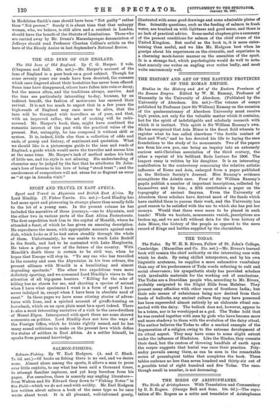THE OLD INNS OF OLD ENGLAND.
The Old Inns of Old England. By C. G. Harper. 2 vols. (Chapman and Hall. 42s. net.)—Mr. Harper's account of the inns of England is a poor book on a good subject. Though for some seventy years our roads have been deserted, the romance which once lingered about their hostelries has never been effaced. Some inns have disappeared, others have fallen into ruin or decay, but the names often, and the traditions always, survive. And the inns are particularly interesting to-day, because, by an indirect benefit, the fashion of motor-cars has ensured their revival. It is not too much to expect that in a few years the high-roads of England may once more be alive, that the inns will be thronged with travellers as of yore, and that, with •an improved cellar, the art of cooking will be redis- covered. Mr. Harper's book, then, might have combined the romantic interest of the past with the practical value of the present. But, unhappily, he has composed it without skill or system. It is, indeed, little else than a collection of odds and ends, of gossip and history, of sentiment and quotation. What we should like is a picturesque guide to the inns and roads of England, a guide which would serve the traveller and amuse him at the same time. Mr. Harper's lack of method makes his book of little use, and his style is not alluring. His understanding of character may be judged by the fact that he attributes Dr. John- son's love of taverns to his love of being "stood treat"; and the carelessness of compositors will not atone for so flagrant an error as "et ego in Arcadia visit"






















































 Previous page
Previous page